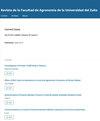大蜡蛾肠道细菌的鉴定
IF 0.5
4区 农林科学
Q4 AGRONOMY
Revista De La Facultad De Agronomia De La Universidad Del Zulia
Pub Date : 2022-12-26
DOI:10.47280/revfacagron(luz).v40.n1.05
引用次数: 0
摘要
在世界各地,使用从化石燃料中提取的工业聚合物几乎是不可避免的,因为它们具有如此广泛的应用;然而,这种做法所引起的环境问题已促使人们寻找可减少其使用的替代品,以及通过使用生物有机活性剂进行降解来控制其使用的战略。昆虫一直是特别感兴趣的焦点,因为一些物种消耗塑料,并可能通过消化道细菌的作用生物降解塑料。在这种情况下,本研究的目的是表征存在于蜡蛾幼虫(蜡螟)肠道中的细菌。30只幼虫饲喂泡沫聚苯乙烯饲料,30只幼虫饲喂自然饲料,试验期7 d。提取胃肠道,进行PCR检测。结果表明,细菌细胞中存在maltaromatium Carnobacterium、sandarakinum Brevibacterium、Pseudomonas psychrophila、Pseudomonas sp.、Providence sp.、杆状杆菌sp.等细菌细胞,但这些细菌群在有效降解聚合物中的实际作用还有待验证。本文章由计算机程序翻译,如有差异,请以英文原文为准。
Identification of the gut bacteria of the greater wax moth
Throughout the world, the use of industrial polymers derived from fossil fuels is practically inevitable because they have such a wide range of applications; however, the environmental problems arising from this practice have led to a search for alternatives which will allow their use to be reduced, as well as strategies for their control by degradation using biorganic active agents. Insects have been a focus of special interest, as some species consume plastics and may serve to biodegrade them through the action of bacteria in their digestive tracts. In this context, the object of the present study was to characterise bacteria present in the intestine of wax moth larvae (Galleria mellonella). Thirty larvae were subjected to a diet based on polystyrene foam and thirty larvae in natural diet for 7 days. Gastrointestinal tracts were extracted and PCR was run. The results showed the presence of bacterial cells of Carnobacterium maltaromaticum, Brevibacterium sandarakinum, Pseudomonas psychrophila, Pseudomonas sp., Providence sp., Corynebacterium sp. However, the real action of these groups of bacteria in the effective degradation of polymers must be verified.
求助全文
通过发布文献求助,成功后即可免费获取论文全文。
去求助
来源期刊
CiteScore
0.50
自引率
0.00%
发文量
45
审稿时长
>12 weeks
期刊介绍:
La Revista de la Facultad de Agronomía de la Universidad del Zulia publica artículos científicos, notas técnicas, comunicaciones rápidas y artículos invitados originales e inéditos, es decir, que no hayan sido publicados ni enviados simultáneamente a otra revista para su publicación, de autores interesados en el campo agrícola vegetal y agrícola animal. De presentarse el caso que el autor o autores hubiesen enviado o publicado su manuscrito simultáneamente en otra revista, podrán ser sancionados con la no publicación en esta revista por tiempo indefinido.
Se admiten manuscritos escritos en idioma Español, Portugués o Inglés, con un resumen en Español o Portugués y otro en Inglés (Abstract).

 求助内容:
求助内容: 应助结果提醒方式:
应助结果提醒方式:


